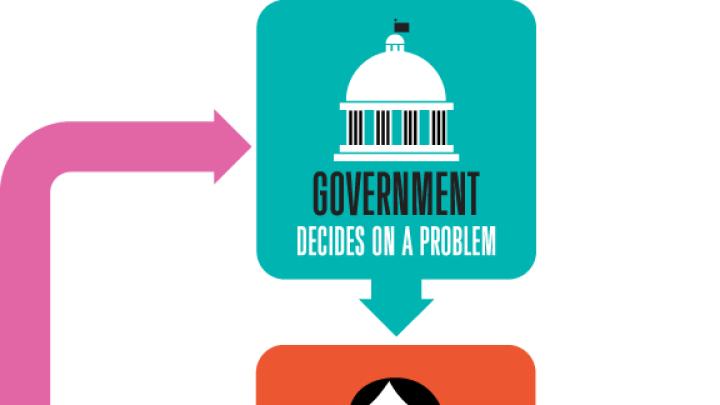Homelessness is a complex social problem that societies often treat, but rarely fix. Existing social services do little to remedy the underlying causes, and governments too often lack the resources and long-term commitment to invest in preventive approaches that could improve lives and reduce society’s burden in a lasting way. And there are many similar problems, from chronic unemployment to juvenile delinquency, that impose ongoing costs on governments and taxpayers. But a new funding mechanism—social impact bonds (SIBs)—may offer an innovative means of harnessing private capital to achieve measurable gains on some of the most persistent social ills. Weiner professor of public policy Jeffrey Liebman is spearheading an effort at Harvard Kennedy School to accelerate their adoption.
SIBs—also known as “social innovation financing” or “pay for success”—offer governments a risk-free way of pursuing creative social programs that may take years to yield results. Usually, governments decide what problems they want to address and then enter a contractual agreement with an intermediary (or bond-issuing organization) that is responsible for raising capital from independent investors including banks, foundations, and individuals, and for hiring and managing nonprofit service providers. If the project achieves its stated objectives, the government repays the investors with returns based on the savings the government accrues as a result of the program’s success. (Taxpayers also receive a portion of the budget gains in the form of freed-up public resources, though the investors may need to be fully paid first.) A neutral evaluator, agreed on by both parties, is hired to measure the outcomes and resolve any disputes that arise.
Liebman became intrigued by the SIB model after learning about a British project that is testing it in an effort to reduce re-imprisonment rates among adult males in the English city of Peterborough. He spent six months studying the issue and in 2011, with the Center for American Progress, published a report on his findings. The paper lays out SIBs’ potential to overcome institutional barriers to social innovation, but Liebman was convinced that American state and local governments lack the necessary staff, time, and expertise to get such projects off the ground. “I realized that if I didn’t find a way to solve the government-capacity problem,” he explains, “this promising approach to contracting for social services wouldn’t get tested.”
He therefore established the Harvard Social Impact Bond Technical Assistance Lab (SIB Lab). Funded by the Rockefeller Foundation, the lab serves as a hands-on think-tank for helping governments foster innovation and improve the results of their social-service spending. The Rockefeller grant supports current students and recent graduates of the school’s master’s in public policy program who provide pro bono assistance in government offices on all aspects of a SIB start-up phase.
Massachusetts was the first state to welcome SIB Lab support. (New York quickly followed.) Ryan Gillette, M.P.P. ’12—one of Liebman’s “government innovation fellows”—has worked full time in the Commonwealth’s budget office since June 2012, helping put together two inaugural SIB deals. One will address homelessness by contracting with the nonprofit Massachusetts Housing and Shelter Alliance to find stable housing for several hundred people. The other will address youth recidivism, providing a range of interventions and supports to the more than 750 young people who “age out” of the juvenile justice system each year. Gillette notes that the SIB financing structure allows governments to identify savings across agencies, which encourages interagency cooperation toward a common goal. “The savings we project for the recidivism project, for instance, are due not only to reduced incarcerations and other adjudication expenses,” he explains, “but also to improved employment and educational outcomes.”
Although initial results from the first SIB projects are a few years away, government interest is growing: when Liebman received additional Rockefeller funds to expand the SIB Lab’s work into four more states, 28 state and city governments applied. (The winners were announced June 10.) The investor market remains harder to predict. George Overholser ’82, the founder and CEO of Third Sector Capital Partners (the intermediary on the Massachusetts recidivism project), notes that banks have responded more quickly to the opportunity than foundations or individuals. “Social innovation financing is not a heartstring puller, but the upside is powerful,” he says. “With traditional philanthropy, you pay for the program and then the money is gone; this way the money comes back and can be recycled into the program to help more people.”
It is too soon to say if social impact bonds will fundamentally change how social services are funded and implemented in the United States. But Liebman sees hope in the way the projects bring public and private actors together on a long-term basis to tackle some of society’s toughest problems. “The key,” he says, “is that all the partners are on the hook for developing better outcomes.”








